Rob Mclennan's Blog, page 82
August 3, 2023
new from above/ground press: Massey, mclennan, Melançon, Hilder, Bowering/Gold, Stearne, Vogler, Gorin, Drescher, Norris, Donato, Pirie + Touch the Donkey #38
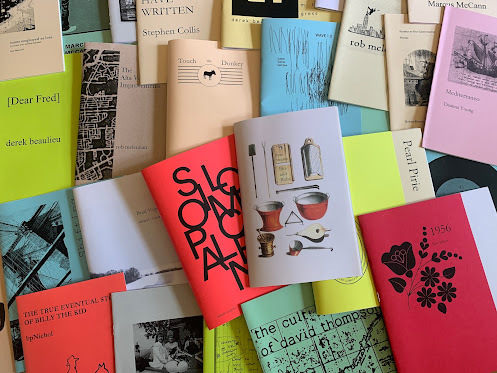 SONGS FROM THE DEMENTIA SUITCASE, Karen Massey $5 ; edgeless : letters, by rob mclennan $5 ; Bridges under the Water, by Jérôme Melançon $5 ; Where there's smoke, by Monty Reid $5 ; {NANCY} [an essay on Nancy Shaw], by Jamie Hilder $5 ; LALIQUE, by George Bowering and Artie Gold $5 ; Bits and Bobs, two stories by Ryan Stearne $5 ; Report from the (Pearl) Pirie Society, Vol. 1 No. 1 $7 ; errand : towards, by Brad Vogler $5 ; Touch the Donkey [a small poetry journal] #38 $7 ; Simple Location, by Andrew Gorin $5 ; “Almost Alive” by Julia Drescher $5 ; ECHOES, by Ken Norris $5 ; Toothache, by Joseph Donato $5 ;
SONGS FROM THE DEMENTIA SUITCASE, Karen Massey $5 ; edgeless : letters, by rob mclennan $5 ; Bridges under the Water, by Jérôme Melançon $5 ; Where there's smoke, by Monty Reid $5 ; {NANCY} [an essay on Nancy Shaw], by Jamie Hilder $5 ; LALIQUE, by George Bowering and Artie Gold $5 ; Bits and Bobs, two stories by Ryan Stearne $5 ; Report from the (Pearl) Pirie Society, Vol. 1 No. 1 $7 ; errand : towards, by Brad Vogler $5 ; Touch the Donkey [a small poetry journal] #38 $7 ; Simple Location, by Andrew Gorin $5 ; “Almost Alive” by Julia Drescher $5 ; ECHOES, by Ken Norris $5 ; Toothache, by Joseph Donato $5 ; keep an eye on the above/ground press blog for author interviews, new writing, reviews, upcoming readings and tons of other material; see the previous batch of backlist here,
published in Ottawa by above/ground press
May-August 2023
as part of the above/ground press 30th anniversary
a/g subscribers receive a complimentary copy of each
To order, send cheques (add $1 for postage; in US, add $2; outside North America, add $5) to: rob mclennan, 2423 Alta Vista Drive, Ottawa ON K1H 7M9. E-transfer or PayPal at at rob_mclennan (at) hotmail.com or the PayPal button (above). Scroll down here to see various backlist titles, or click on any of the extensive list of names on the sidebar (many, many things are still in print).
Review copies of any title (while supplies last) also available, upon request.
and don't forget THE ABOVE/GROUND PRESS 30TH ANNIVERSARY READING/LAUNCH/PARTY! Sat, Aug 12, 2023 : Clocktower Brew Pub, Glebe; celebrating THIRTY YEARS of continuous activity (and nearly thirteen hundred publications)
Forthcoming chapbooks by Colin Dardis, Sophia Magliocca, Russell Carisse, Micah Ballard, Cary Fagan, Jennifer Baker, Amanda Deutch, Kevin Stebner, Kyla Houbolt, Gary Barwin, Adriana Oniță, Noah Berlatsky, Heather Cadsby, Blunt Research Group, Phil Hall + Steven Ross Smith, Zane Koss, Peter Myers, Gil McElroy, Ben Robinson, Miranda Mellis, MLA Chernoff, Terri Witek, Geoffrey Olsen, Pete Smith, Robert van Vliet, Marita Dachsel, Grant Wilkins and Angela Caporaso (among others, most likely). And there’s totally still time to subscribe for 2023, by the way (backdating to January 1st, obviously).
August 2, 2023
12 or 20 (second series) questions with Laila Malik
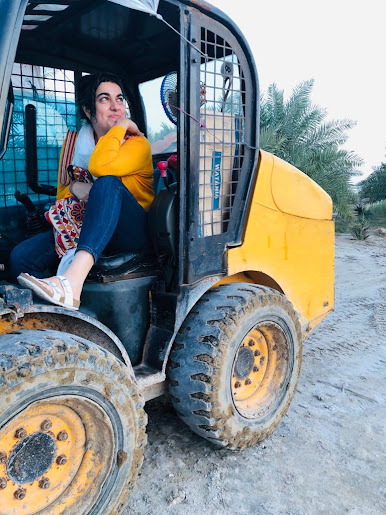 Laila Malik is a desisporic settler and writer living in Adobigok, traditional landof Indigenous communities including the Anishinaabe, Seneca, MohawkHaudenosaunee, and Wendat. Her debut poetry collection, archipelago (Book*HugPress, 2023) has been described as haunting, tender and exquisite (SalmaHussain, Temz Review) and was named one of the CBC's Canadian poetrycollections to watch for in 2023. Her essays have been nominated for thePushcart Prize and Best of the Net anthology, longlisted for five differentcreative nonfiction and poetry contests, and widely published in Canadian andinternational literary journals. Malik has been awarded grants from the CanadaCouncil for the Arts and the Ontario Council for the Arts, and was a fellow atthe Banff Centre for Creative Arts for her novel-in-progress.
Laila Malik is a desisporic settler and writer living in Adobigok, traditional landof Indigenous communities including the Anishinaabe, Seneca, MohawkHaudenosaunee, and Wendat. Her debut poetry collection, archipelago (Book*HugPress, 2023) has been described as haunting, tender and exquisite (SalmaHussain, Temz Review) and was named one of the CBC's Canadian poetrycollections to watch for in 2023. Her essays have been nominated for thePushcart Prize and Best of the Net anthology, longlisted for five differentcreative nonfiction and poetry contests, and widely published in Canadian andinternational literary journals. Malik has been awarded grants from the CanadaCouncil for the Arts and the Ontario Council for the Arts, and was a fellow atthe Banff Centre for Creative Arts for her novel-in-progress.1 - How did your first book changeyour life? How does your most recent work compare to your previous? How does itfeel different?
My first book was avery slow, jigsaw process of building courage and coming to acceptance. I comefrom a people who are intensely private, and the prospect of publishing hasalways posed carried great risk to me and to us. I had to slowly come to termswith the idea of becoming more public, and think through ways to navigate alandscape that was foreign and riddled with real and perceived threat. But oneof the most wonderful results has been the opportunity to connect withindividuals who were just as starved as I had been for more complex diasporastories, and specifically voices from our hitherto unspoken experience as SouthAsians coming of age in the Arabian Gulf.
I still writepoetry after archipelago, but I havebeen trying the new challenge of novel-writing, which so far feelscomparatively slow and clumsy. I did a residency at Banff where a mentormentioned that it takes on average between four and six years to complete anovel, and that sounds about right. Add to that the daily needs of paying thebills and feeding the children, and who knows how much longer it might take?
2 - How did you come to poetry first,as opposed to, say, fiction or non-fiction?
I was a high schoolmisfit in a place of impossible airlessness, skulking the dusty aisles of mylibrary to alleviate desperate boredom when I came upon two forms that changedmy life: poetry and plays. There was ee cummings and Eugene Ionesco, and thestrange speed and immediacy of poetry, alongside the radical but upside-down,inside-out approach of the theatre of the absurd in particular, split open myuniverse of possibility. I was stunned that this work was sitting casually anduntouched in the middle of an otherwise strictly guarded world. I began acorrespondence with another poetic rebel friend, and we compared notes on formand content, pushing one another to try new things with words on paper to speakto all things unspeakably sublime and grotesquely unbearable.
But it wasn’t untilI got to university and encountered the work of feminist, and especially Blackfeminist poets like Audre Lorde and June Jordan that I began to understandpoetry as innate and experiential to the lives of women and those who arerepeatedly kept out of institutions of power, a form that is fundamentallyrevolutionary and accessible. I could and did write poetry in hospitalhallways, in the mosque, at 3am while feeding a child, after a racist or sexistencounter at a supermarket, with a boss, with a government official. Poetrygleams from within the blood and visceral filth of the every day and so Iseized it quickly and greedily and eternally as mine, before anyone could tellme any different.
Finally, in 2017, Iwas selected to participate in a small, advanced poetry workshop withaward-winning poet and author Chelene Knight. Besides being a phenomenalwriter, Chelene has devoted her career to enabling writers to succeed andnavigate the publishing world with creative balance. The workshop was pivotalfor me in terms of deepening my craft, understanding the industry, and gainingenough confidence to take the next step. archipelagowas born of that process.
I did and do writefiction and non-fiction, but it requires a different kind of time andattention.
3 - How long does it take to startany particular writing project? Does your writing initially come quickly, or isit a slow process? Do first drafts appear looking close to their final shape,or does your work come out of copious notes?
My writerlythoughts initially come quickly, and most often in the place between sleep andconsciousness. It’s always a question of how persistent those thoughts are thatdetermine whether they make it to paper. Poems almost always get completed,seconded by essays. Fiction is a whole other ballgame and seems to engage anentirely different part of my brain.
4 - Where does a poem or work ofprose usually begin for you? Are you an author of short pieces that end upcombining into a larger project, or are you working on a "book" fromthe very beginning?
For me, poemsusually begin from an experience or observation, suffused with strong emotion,often emerging as snippets in my journaling. Essays begin when I’m wrestlingwith an incident or dynamic that has no name or precedent, and I’m compelled todocument and make sense of it. Fiction begins with a flirtation with outrageouspossibility – perhaps the reason I’ve yet to really fully explore that path.
5 - Are public readings part of orcounter to your creative process? Are you the sort of writer who enjoys doingreadings?
The prospect ofpublic readings used to fill me with the deepest dread but since publishing archipelago I’ve come to look forward toit – the opportunity to connect with readers and other writers is precious.People who were waiting for me to give name and life to experiences and didn’tquite know it, much as I have waited for other writers to do the same for me.I’m not sure how much it propels my creative process but it does remind me tostay in the room, and not to get too distracted by the drudgeries of life tocontinue the practice.
6 - Do you have any theoreticalconcerns behind your writing? What kinds of questions are you trying to answerwith your work? What do you even think the current questions are?
Certainly. I’mpreoccupied with the big ticket items – eco-collapse, spirituality, encountersbetween gender, imperialism and petty human power-mongering around identity,all from the perspectives of the specific groups of peoples from whom I draw mylineages and in the context of the most unprecedented migratory movement ourplanet has ever seen. I suppose my “the questions” are “Who are we becoming?What are we choosing? And what will be the outcomes?”
7 – What do you see the current roleof the writer being in larger culture? Do they even have one? What do you thinkthe role of the writer should be?
After decades ofshirking that question for fear of sinking into hackneyed hubris, I’ve come to thinkthat the role of the writer is to provide relief to the reader by giving voiceto the complex vagaries and possibilities of existence. A window through whichto see and be seen, hence to feel fulfilled. In an essay I wrote for my latesister, I talk about seeing the CN tower on a prodigal return to Toronto, andhow it provided “a reassurance, corresponding with my earliest memory. Asingle, immovable constant, proof that we happened, my family and I.” Don’t weall want to be assured that we happened?
8 - Do you find the process ofworking with an outside editor difficult or essential (or both)?
It really dependson the editor. For the most part, I find it to be an incredibly rewarding,educational experience – almost all of the editors I’ve worked with have anincredible eye, and show me things I hadn’t seen. On the rare occasion I’veworked with a pedant, or an editor who is really not getting where I’m comingfrom or what I’m trying to do, and I’ve found it necessary to learn how to holdmy ground a bit. Overall I do find it to be an essential and extremely usefulpart of the process.
9 - What is the best piece of adviceyou've heard (not necessarily given to you directly)?
Keep writing.
10 - How easy has it been for you tomove between genres (poetry to essays)? What do you see as the appeal?
I spent a long timein the academy, and work in communications, so I do tend to move betweendifferent types of writing frequently. My approach to essays, though, issteeped in poetry, so I haven’t found it difficult at all. On the other hand,there are some readers who have found it challenging. I’m thinking of aworkshop I did many years ago, in which the instructor, despite seeming toreally like my work, scratched her head at my meandering, sometimes rhythmic,alliterative and occasionally absurd sentences. But that’s my jam and I’m happywith it.
11 - What kind of writing routine doyou tend to keep, or do you even have one? How does a typical day (for you)begin?
In a perfect worldI would journal religiously. Life and its upkeep often keep me from this goal.
12 - When your writing gets stalled,where do you turn or return for (for lack of a better word) inspiration?
Books, film, travel(when available), visits to desi neighbourhoods, family.
13 - What fragrance reminds you ofhome?
Jasmine, thai basiland the salt scent of the Arabian Gulf at night.
14 - David W. McFadden once said thatbooks come from books, but are there any other forms that influence your work,whether nature, music, science or visual art?
All of the above,but definitely nature, science and music. It’s been decades since I saw it, butthe Indian Ocean fires every one of my neurons.
15 - What other writers or writingsare important for your work, or simply your life outside of your work?
So many. When I wasyounger, I was so influenced by the humour and absurd possibility in TerryPratchett and Neil Gaiman’s works. More recently, my jaw was reset by AkwaekeEmezi’s Dear Senthuran. Ocean Vuong’sOn Earth We Are Briefly Gorgeous tookmy breath away and reminded me, as did Noor Naga’s If an Egyptian Cannot Speak English, that it is not impossible towrite a poetic novel beautifully and with solid, coherent, narrativearchitecture, and that this ultimately is what I want to achieve next.
16 - What would you like to do thatyou haven't yet done?
See above. I’mworking to achieve this with my novel-in-progress, Bitumen, but I have a long way to go.
17 - If you could pick any otheroccupation to attempt, what would it be? Or, alternately, what do you think youwould have ended up doing had you not been a writer?
I pay the billswith communications but I think it would have been deeply rewarding to be azoologist or a meteorologist, had I had more of a scientific brain.
18 - What made you write, as opposedto doing something else?
The feeling of beingchronically, constantly, eternally silenced, and the irrepressible need to givevoice to the unspoken, the grotesque, the beautiful, the ludicrous, thepossible.
19 - What was the last great book youread? What was the last great film?
Book: Noor Naga’s If an Egyptian Cannot Speak English.Film: Desi Standard Time Travel, anincredibly sweet, funny and poignant short by Kashif Pasta. I hope they bothget turned into feature films.
20 - What are you currently workingon?
I’m working on myfirst novel, which germinated twenty years ago in a very different world and avery different moment in my life. I’ve been trying to work out who it is now,and what it needs to say.
I’m alsocontemplating a book of essays, comprised of some of the work I’ve alreadypublished, alongside newer work. Thinking through narrative threads andconsidering publication options.
August 1, 2023
Once upon a time in the West (of Ottawa, but still in Ontario, (part three,
[see part one here; part two here]
 Friday, July 28, 2023: I should have mentionedour visit the prior afternoon to Story Book Land, to meet up with Andrea, afriend of Christine’s we haven’t seen in a few years, so we could meet theirtwo-year-old, also. The three young ladies ran a couple of hours through thepark, catching a mix of storybook characters, child-sized rides and a smallwaterpark. The focus was for an age group a bit younger than Rose (and therewas at least one ride she was too tall for), but that was fine enough. Rose attendedthe two-year-old, and Aoife ran through a plethora of rides on her own (as I followed,although the rides safe enough that attendants don’t seem to be awaitingparental permissions to put kids through). There was even an assemblage of animals, including rabbits, and deer that screamed such screams as they must have stories told of them involving ghosts or demons (or both). Unsettling. But Aoife and I finally used that quarter we found at the Big Apple on DAY ONE of our big ridiculous trip to collect corn to hand-feed them.
Friday, July 28, 2023: I should have mentionedour visit the prior afternoon to Story Book Land, to meet up with Andrea, afriend of Christine’s we haven’t seen in a few years, so we could meet theirtwo-year-old, also. The three young ladies ran a couple of hours through thepark, catching a mix of storybook characters, child-sized rides and a smallwaterpark. The focus was for an age group a bit younger than Rose (and therewas at least one ride she was too tall for), but that was fine enough. Rose attendedthe two-year-old, and Aoife ran through a plethora of rides on her own (as I followed,although the rides safe enough that attendants don’t seem to be awaitingparental permissions to put kids through). There was even an assemblage of animals, including rabbits, and deer that screamed such screams as they must have stories told of them involving ghosts or demons (or both). Unsettling. But Aoife and I finally used that quarter we found at the Big Apple on DAY ONE of our big ridiculous trip to collect corn to hand-feed them.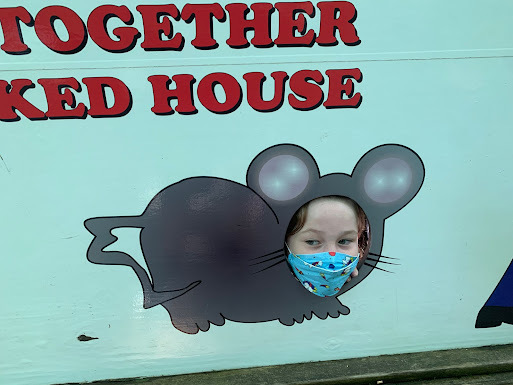
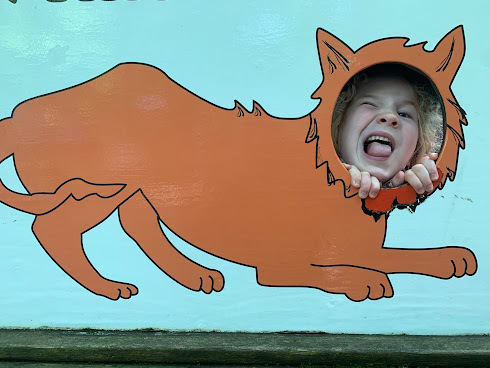 This morning, on our way out oftown, we hit that same park a second time, to meet up with another friendof Christine’s, who drove a two-hour stretch to meet up with us there, alongwith her own daughter, nearly as old as Rose. The three of them ran as atrio through multiple rides and even the water-slides. Does anyone remember the late Storyland park just outside of Ottawa, in Renfrew? It was similar to thisplace, except sans the rides or waterpark or train: simply (semi-creepy) fairytale characters set in the woods that, after a number of years, had begun to erode.I think we went there as kids, and again, once Kate was small. It erodedcompletely not long after that.
This morning, on our way out oftown, we hit that same park a second time, to meet up with another friendof Christine’s, who drove a two-hour stretch to meet up with us there, alongwith her own daughter, nearly as old as Rose. The three of them ran as atrio through multiple rides and even the water-slides. Does anyone remember the late Storyland park just outside of Ottawa, in Renfrew? It was similar to thisplace, except sans the rides or waterpark or train: simply (semi-creepy) fairytale characters set in the woods that, after a number of years, had begun to erode.I think we went there as kids, and again, once Kate was small. It erodedcompletely not long after that. 
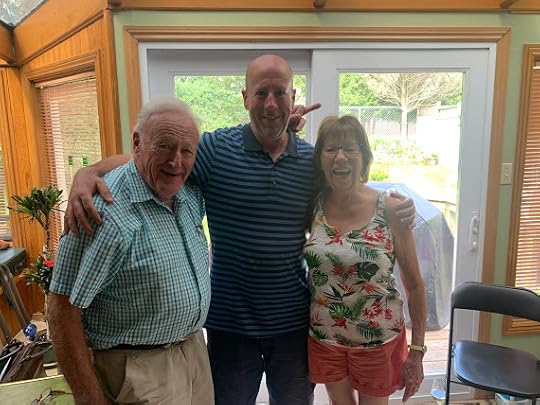
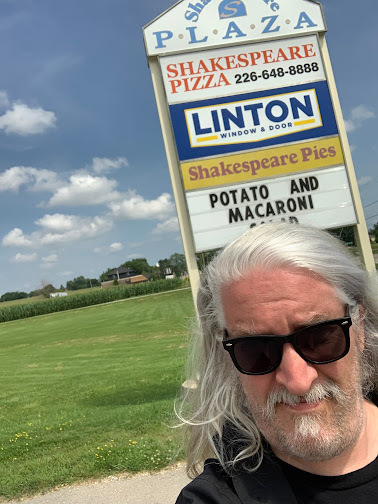 Fromthere we headed direct to Woodstock, to visit my Aunt Pam and Uncle Don, aswell as my cousin Kent. A two-and-a-half hour drive. We passed so many smalltowns on the turn upon turn of highways, including Shakespeare, which I had noidea existed. Founded in 1832, it was renamed some twenty years later, after someonesuggested renaming after the infamous playwright. We saw numerous cemeteriesalong the route as well, including a couple of cemeteries that had small squareclusters of ancient white gravestones in a block, as though moved from someother site. Why are cemeteries, at least from out that way, moved at all? I wouldlike an answer from someone on this.
Fromthere we headed direct to Woodstock, to visit my Aunt Pam and Uncle Don, aswell as my cousin Kent. A two-and-a-half hour drive. We passed so many smalltowns on the turn upon turn of highways, including Shakespeare, which I had noidea existed. Founded in 1832, it was renamed some twenty years later, after someonesuggested renaming after the infamous playwright. We saw numerous cemeteriesalong the route as well, including a couple of cemeteries that had small squareclusters of ancient white gravestones in a block, as though moved from someother site. Why are cemeteries, at least from out that way, moved at all? I wouldlike an answer from someone on this.Pamis the last of my mother’s siblings, and the next in line from my mother’sthird-of-seven. Don was the minister we solicited to conduct our wedding, whoalso conducted my sister’s, as well, and a number of family funerals over theyears. It was very good to see them without a funeral, and the weddings havebecome sparse and scattered as the further generations spread apart (and thefirst time they’d met Aoife, as well as the second time they’d seen Rose). Thelast time we were in their house was their fiftieth anniversary a few yearsago, when I couldn’t get toddler Rose to stop running around (even though shewas relatively quiet, she would not sit still, happily exploring the room atfull speed). Apparently they considered her a delight! An equal, I suppose, to whenI brought toddler Kate to their elder son (my cousin) Kayle’s wedding in Londonback in 1993 or so. And Pam even said we were staying in the same hotel! Which Iwouldn’t have remembered. And then over to London! To crash at the hotel.
London,Ontario! The land of Greg Curnoe (1936-1992) and Christopher Dewdney’s A Palaeozoic Geology of London, Ontario (Coach House, 1974) and The Nihilist Spasm Band!Jean McKay! The origins of Brick Books and Brick: A Literary Journal! Oh, London!

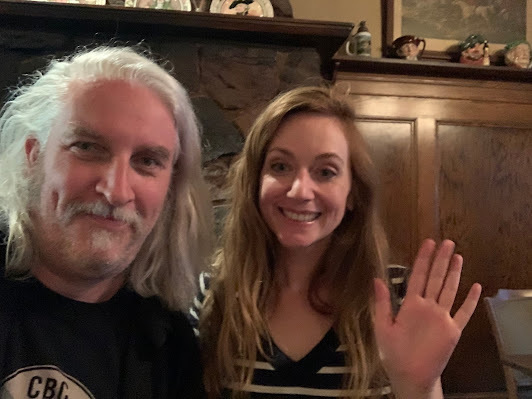 Saturday, July 29, 2023: Woke, in London,Ontario. Everyone slept in except Christine, who had to be at her conference at8am. The rest of our trio woke slowly, and lounged in our room. We lounged,went for lunch, and drove an hour to Norwich, to do some further visiting. We spentthe whole afternoon as the young ladies met up with some pigs (they smell sobad! they said), ducks, chicken and even some newly-hatched quail. It was agood afternoon, before we headed back downtown to meet Christine and herconference for dinner at a local pub. I posted to BlueSky that we were there,and (semi-accidental) book blogger Sarah (literal_nobody) caught that we were in town, and askedif she could come get a book signed? Sure! And she spent the whole timedelighting in our young ladies, and in deep conversation. The children wroteher poems and stories and Rose told a wealth of stories. Rose seemed verypleased to be involved in grown-up conversation.
Saturday, July 29, 2023: Woke, in London,Ontario. Everyone slept in except Christine, who had to be at her conference at8am. The rest of our trio woke slowly, and lounged in our room. We lounged,went for lunch, and drove an hour to Norwich, to do some further visiting. We spentthe whole afternoon as the young ladies met up with some pigs (they smell sobad! they said), ducks, chicken and even some newly-hatched quail. It was agood afternoon, before we headed back downtown to meet Christine and herconference for dinner at a local pub. I posted to BlueSky that we were there,and (semi-accidental) book blogger Sarah (literal_nobody) caught that we were in town, and askedif she could come get a book signed? Sure! And she spent the whole timedelighting in our young ladies, and in deep conversation. The children wroteher poems and stories and Rose told a wealth of stories. Rose seemed verypleased to be involved in grown-up conversation.
 Backat the hotel, ridiculously late, as our young ladies howled at the London moon.How many nights might it take, I wonder, to get them back into their normalsleeping routines?
Backat the hotel, ridiculously late, as our young ladies howled at the London moon.How many nights might it take, I wonder, to get them back into their normalsleeping routines?
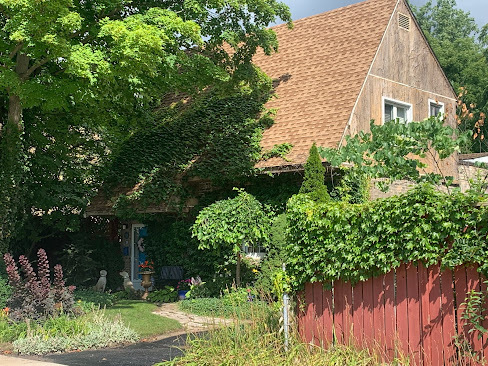 Sunday, July 30, 2023: We woke in London,slowly. What did we do? It all seems a blur, now. We made sure the children hadbreakfast before a quick visit to the hotel pool as I packed up the car, givenour 11am check-out. They changed, and we headed off. On our way out of town wemade a quick stop at the late London, Ontario artist Greg Curnoe’s infamoushouse at 38 Weston Street—the same plot of land he wrote about in his infamous
Deeds/Abstracts:The History of a London Lot
(Brick Books, 1995)—for a pilgrimage, catchinga view of the Victoria Hospital (subject of more than a couple of his paintings) en route. Do folk make art pilgrimages to hospitals? I suppose, I did see a bpNichol/Barbara Caruso work while visiting my father in the Heart Institute a few years ago [see that post here]. Since my twenties, the contemporary works by such asCurnoe or Roy K. Kiyooka have always been the ones I checked out first at theNational Gallery of Canada. Have you ever seen that mural he did for theMontreal airport? There’s a whole story there. I think George Bowering wroteabout that, somewhere (he helped install the piece, originally).
Sunday, July 30, 2023: We woke in London,slowly. What did we do? It all seems a blur, now. We made sure the children hadbreakfast before a quick visit to the hotel pool as I packed up the car, givenour 11am check-out. They changed, and we headed off. On our way out of town wemade a quick stop at the late London, Ontario artist Greg Curnoe’s infamoushouse at 38 Weston Street—the same plot of land he wrote about in his infamous
Deeds/Abstracts:The History of a London Lot
(Brick Books, 1995)—for a pilgrimage, catchinga view of the Victoria Hospital (subject of more than a couple of his paintings) en route. Do folk make art pilgrimages to hospitals? I suppose, I did see a bpNichol/Barbara Caruso work while visiting my father in the Heart Institute a few years ago [see that post here]. Since my twenties, the contemporary works by such asCurnoe or Roy K. Kiyooka have always been the ones I checked out first at theNational Gallery of Canada. Have you ever seen that mural he did for theMontreal airport? There’s a whole story there. I think George Bowering wroteabout that, somewhere (he helped install the piece, originally).And wedrove through Milton! That’s where Jason Christie is from!

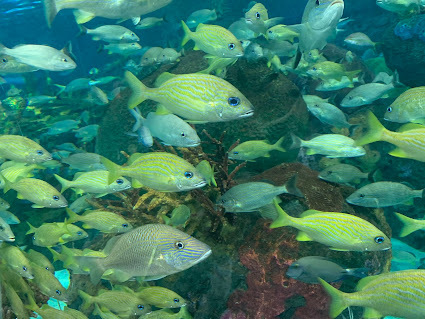 Andto Toronto, where we land at the airport-ish hotel to drop our things, shuttleto the airport and train downtown for the sake of a few hours wandering the Aquarium.Andy Weaver (famous Burlington poet) and his family were watching a Blue Jays game simultaneously, so wehad originally thought (a week earlier) that perhaps that might be a time andspace to meet up (we were literally next door), but that didn’t quite work outeither. Ah well. We wandered the aquarium and then to the gift shop as thechildren argued, wandered back through the aquarium to the play centre, whichthey didn’t like, and back to the gift shop where the children argued somemore. Everyone is tired! All my bones from the waist below have begun to ache. Whathas become of us?
Andto Toronto, where we land at the airport-ish hotel to drop our things, shuttleto the airport and train downtown for the sake of a few hours wandering the Aquarium.Andy Weaver (famous Burlington poet) and his family were watching a Blue Jays game simultaneously, so wehad originally thought (a week earlier) that perhaps that might be a time andspace to meet up (we were literally next door), but that didn’t quite work outeither. Ah well. We wandered the aquarium and then to the gift shop as thechildren argued, wandered back through the aquarium to the play centre, whichthey didn’t like, and back to the gift shop where the children argued somemore. Everyone is tired! All my bones from the waist below have begun to ache. Whathas become of us?
 Andslowly back on the train and the shuttle to hotel, where we had room serviceand a quiet evening doing whatever it is we all do. I wrote out some postcards,and the young ladies did also. Should we check out the pool?
Andslowly back on the train and the shuttle to hotel, where we had room serviceand a quiet evening doing whatever it is we all do. I wrote out some postcards,and the young ladies did also. Should we check out the pool?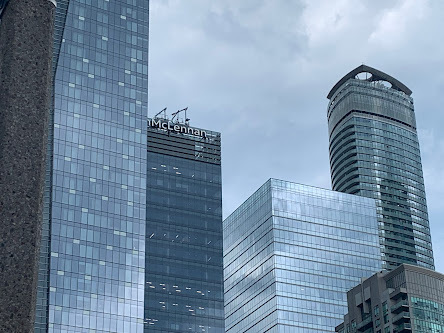 Oh, and this building is mine now. I don't care what it holds.
Oh, and this building is mine now. I don't care what it holds.Monday, July 31, 2023: Leaving Toronto forPicton, where we are most likely overnight and dropping our young ladies. Everythingmoves slow. The theory is we drop the kids at father-in-law’s for the week as wehead back ourselves Tuesday morning, so Christine can return to work. Presumingall works well with that plan, we’ll see them again come Saturday.
July 31, 2023
12 or 20 (second series) questions with Astrid Blodgett
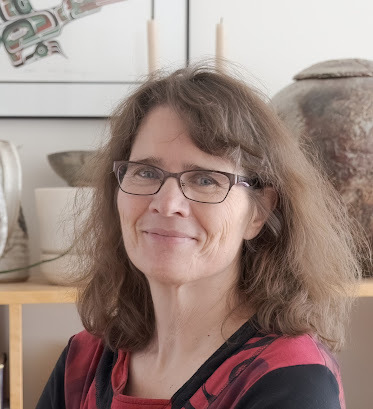 Astrid Blodgett is the author of the short story collections This is How You Start to Disappear (UAlberta Press) and You Haven’t Changed a Bit (UAlberta Press). Her stories have appeared in The Journey Prize Anthology, Meltwater: Fiction and Poetry from the Banff Centre for the Arts, the Danish textbook Connect, in many Canadian literary magazines, and in translation in Inostrannaya Literatura. One of her stories was short-listed for the Writers’ Guild of Alberta Howard O’Hagan Award for Short Story; her first book was long-listed for a ReLit Award, a runner-up for the Danuta Gleed Literary Award, and a finalist for the High Plains Book Award for Short Stories. She is also a co-author of
Recipes for Roaming: Adventure Food for the Canadian Rockies
. For many years she co-hosted a literary salon in her home. Astrid also loves multi-day river trips and long walks. She lives in Edmonton / amiskwaciwâskahikan.
Astrid Blodgett is the author of the short story collections This is How You Start to Disappear (UAlberta Press) and You Haven’t Changed a Bit (UAlberta Press). Her stories have appeared in The Journey Prize Anthology, Meltwater: Fiction and Poetry from the Banff Centre for the Arts, the Danish textbook Connect, in many Canadian literary magazines, and in translation in Inostrannaya Literatura. One of her stories was short-listed for the Writers’ Guild of Alberta Howard O’Hagan Award for Short Story; her first book was long-listed for a ReLit Award, a runner-up for the Danuta Gleed Literary Award, and a finalist for the High Plains Book Award for Short Stories. She is also a co-author of
Recipes for Roaming: Adventure Food for the Canadian Rockies
. For many years she co-hosted a literary salon in her home. Astrid also loves multi-day river trips and long walks. She lives in Edmonton / amiskwaciwâskahikan.1 - How did your first book change your life? How does your most recent work compare to your previous? How does it feel different?
It did not change my life (well, except that I could stop fiddling with the stories I had been fiddling with for a long time).
I think some of the lines in my first collection are more poetic than much of the second collection. But it's hard to see your own work clearly after you've sat with it for too long. Otherwise, it feels about the same. The annoying pre-publication jitters!
2 - How did you come to fiction first, as opposed to, say, poetry or non-fiction?
I may have started life as a poet, but I started writing so long ago I am no longer certain what I wrote first. (I wrote both poetry and fiction as a child/teenager.) When I began writing seriously as an undergraduate student, I wrote poetry, simply because I liked the form and it was right for what I wanted to say. When I decided to pursue writing more seriously as a graduate student, I made the switch to short stories because my dad was a poet. It was a difficult transition (my stories were rather short and I suspect I may not always have written in full sentences, and my fellow writing workshop pals were often confused).
3 - How long does it take to start any particular writing project? Does your writing initially come quickly, or is it a slow process? Do first drafts appear looking close to their final shape, or does your work come out of copious notes?
Writing used to come quickly for me. Now it is slower. This is the problem with becoming more discerning no doubt.
I don't take notes. I simply start and keep going, keep going, keep going.
4 - Where does a work of prose usually begin for you? Are you an author of short pieces that end up combining into a larger project, or are you working on a "book" from the very beginning?
I write short stories that sometimes get longer and when I have enough, I try to find a publisher for the collection. I don't think of it as a "book" at the beginning.
5 - Are public readings part of or counter to your creative process? Are you the sort of writer who enjoys doing readings?
No and no and no. They're part of what I do to share my work and hope people buy my book. :-)
6 - Do you have any theoretical concerns behind your writing? What kinds of questions are you trying to answer with your work? What do you even think the current questions are?
No theoretical concerns. I try to answer why people do what they do. I try to get into people's hearts and in their skin (usually via their kitchens and bedrooms).
7 – What do you see the current role of the writer being in larger culture? Do they even have one? What do you think the role of the writer should be?
It doesn't have to be anything, but it can be. The writer, intentionally or not, presents the thinking (or her idea of it) of the time, whether about the present, the past, the future. Some writers might have a political goal.
8 - Do you find the process of working with an outside editor difficult or essential (or both)?
Essential and greatly appreciated. Not usually difficult. Editors want your work to be the best it can be. Editors can save you from sending crap out in the world.
9 - What is the best piece of advice you've heard (not necessarily given to you directly)?
Keep writing. (Oh, and read widely.)
10 - What kind of writing routine do you tend to keep, or do you even have one? How does a typical day (for you) begin?
I don't have a routine; I am also working to earn money and this sucks up time and mental energy. I used to go to a writing retreat once or twice a year for 5 days or so and this helped me get a good start on something I could work on at home.
11 - When your writing gets stalled, where do you turn or return for (for lack of a better word) inspiration?
I take a break. I pick up my baroque recorder and play. I go for a walk alone. I read a really good short story.
12 - What fragrance reminds you of home?
Hand cream.
13 - David W. McFadden once said that books come from books, but are there any other forms that influence your work, whether nature, music, science or visual art?
Yes, all of the above.
14 - What other writers or writings are important for your work, or simply your life outside of your work?
Mostly short story writers but also writers who play with form, among them Sue Goyette, Claire Keegan, Shaena Lambert, Lisa Moore, Lorrie Moore, Gaetan Soucy.
15 - What would you like to do that you haven't yet done?
Something bigger, perhaps. A novella. Or bigger in scope within a short story. Something with greater impact.
16 - If you could pick any other occupation to attempt, what would it be? Or, alternately, what do you think you would have ended up doing had you not been a writer?
What a thought. Let's not go there.
17 - What made you write, as opposed to doing something else?
Because I didn't think of anything else? But seriously, I started writing, I was told, as soon as I could hold a pencil, no doubt because I grew up in a home full of books and with someone who wrote poetry much of the time (in his head or on paper) and a raku potter. My brain/hands couldn't figure out clay. My brain likes words.
18 - What was the last great book you read? What was the last great film?
Book: A tie between I (Athena) by Ruth Dyck Fehderau and What Strange Paradise by Omar El Akkad
Movie: The Quiet Girl , based on Claire Keegan's Foster
19 - What are you currently working on?
Trying to start a long story. Trying to find the right way in/the right voice.
12 or 20 (second series) questions;
July 30, 2023
Once upon a time in the West (of Ottawa, but still in Ontario, (part two,
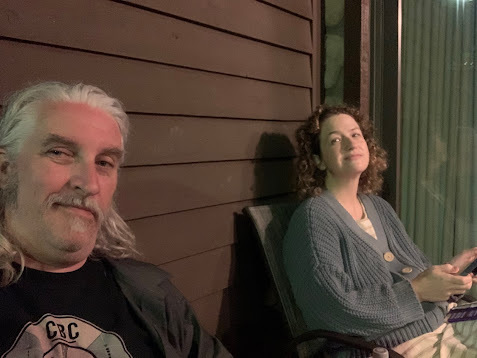 Tuesday, July 25, 2023: Slept terribly, despitethe better arrangements. The Oakville hotel was fine enough, the kids sharing abed, but somehow that was a better sleep. Here they have bunk beds with ahalf-wall between us, and it wasn’t as great. Stupid away-from-home.
Tuesday, July 25, 2023: Slept terribly, despitethe better arrangements. The Oakville hotel was fine enough, the kids sharing abed, but somehow that was a better sleep. Here they have bunk beds with ahalf-wall between us, and it wasn’t as great. Stupid away-from-home.Todaywas attempting to enjoy all the amenities the Great Wolf Lodge offered,especially given how much the damn thing costs. I was tempted to jump acrossthe border and sell a kidney, which prompted my eldest daughter, Kate, toprovide me how much I’d get for such a thing (somehow this is information shealready knows off the top of her head; “it’s not my fault the internet is gross,”she responded). Again, we literally haven't taken the children to anything, given Covid, so it makes sense, I suppose, that this trip is attempting to make up for the past few years. There was wave pool and arcade and bowling and yoga and anelaborate self-directed wizard-game of some sort and a bunch of other excitements.I used the opportunity to read The Loneliness of the Long-Distance Cartoonist (2020) by Adrian Tomine. It is really good. The children wore themselves out on their quests, we sent each other texts when they ran by (sitting in different corners of the hotel) and I managed some reading.
Sadto hear that a cousin on my birth mother’s side, Jaime, died earlier this week.She was one of the first on my birth mother’s side to reach out upon “discovery”a couple of years back, and responded with an enthusiasm I appreciated. We hadn’ta chance yet to meet, which was frustrating. Through emails, I discoveredanother cousin, Micah, is apparently here with his family, but not sure if he’llreach out and attempt to connect. I told his parents, including my Uncle Dale,my birth mother’s brother, that he’s welcome to text me if he’s able and/orinterested. As of yet, I have yet to see him (and I’ve been looking).
Mypal b stephen harding and his lovely wife Gemma were at the falls yesterday,which was amusing to be that close in a different part of the province. I thinkwe considered the possibility of meeting up, but it wouldn’t have been easy. We’llcatch up on stories once we’re back home.
Theentire afternoon, spent in the waterpark area. So much waterpark area. NormallyI hate water, but bringing the bags in from the car across two loads yesterdaywas so bloody hot it was enough to prompt me into the water. Once we’re backhome, I’m sure everything will return to normal, and I’ll be avoiding it againlike an old, irritable cat. The young ladies don’t know how lucky they have itright now (or maybe they do).
Bothnights we’ve been here, seeing a local skunk (I doubt he commutes in) wander byour back door. After the children asleep, sitting just outside the back door. Lastnight, he startled us, so we came back in. Tonight, he just wandered by.
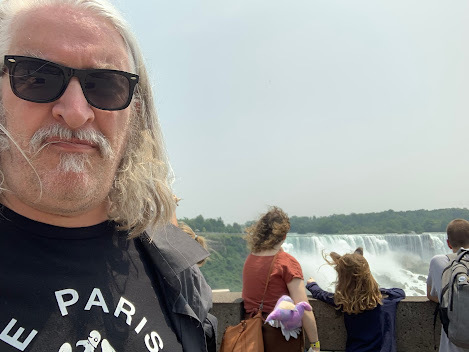 Wednesday, July 26, 2023: It seems odd to bewaking most mornings before the young ladies. I mean, I’m not exactly waking anyearlier than normal, but they’re staying up much later, I suppose. To be upbefore Aoife seems baffling to me. Rose can easily sleep longer if we let her,at least at home. She’s often the last of us to rise. We attended to the lastelements of our big ridiculous Big Wolf Lodge adventures (another stretch of the wave pool, at Aoife's insistence) beforeheading off to catch a quick view of the falls themselves, which was only abouta five minute drive down the road. We parked, walked by the carnival row ofdowntown Niagara Falls strip (ice cream en route, of course, so it would be long gone by the time we returned to the car) and saw themagnificence of the falls. The children were impressed, at least. And then wereturned to the car and drove north, easily passing twenty or so cemeteries. Are we driving through cemetery country?
Wednesday, July 26, 2023: It seems odd to bewaking most mornings before the young ladies. I mean, I’m not exactly waking anyearlier than normal, but they’re staying up much later, I suppose. To be upbefore Aoife seems baffling to me. Rose can easily sleep longer if we let her,at least at home. She’s often the last of us to rise. We attended to the lastelements of our big ridiculous Big Wolf Lodge adventures (another stretch of the wave pool, at Aoife's insistence) beforeheading off to catch a quick view of the falls themselves, which was only abouta five minute drive down the road. We parked, walked by the carnival row ofdowntown Niagara Falls strip (ice cream en route, of course, so it would be long gone by the time we returned to the car) and saw themagnificence of the falls. The children were impressed, at least. And then wereturned to the car and drove north, easily passing twenty or so cemeteries. Are we driving through cemetery country? Whenin Owen Sound, naturally, one begins to think about the sound poetry group Owen Sound, yes? I mean, everyone else does that as well, right?
Whenin Owen Sound, naturally, one begins to think about the sound poetry group Owen Sound, yes? I mean, everyone else does that as well, right?Rainedheavily, but luckily it began well after we landed here. Amy Dennis' house, backed up against the banks of the Sydenham. Lovely. There were swans, also, but swimming separately, as Amy said they must not be getting along at the moment.
A cat in the window across from Amy's house. I don't like the way it keeps looking at me.
Thursday, July 27, 2023: Woke, in Owen Sound. We’respending two nights with the delightful Amy Dennis, a poet that Christine metduring her Toronto days, pre-Ottawa. She even launched her first book this pastspring as part of VERSeFest in Ottawa, which was pretty exciting. A slow movingday, simply hanging out with her. Very nice to catch up.

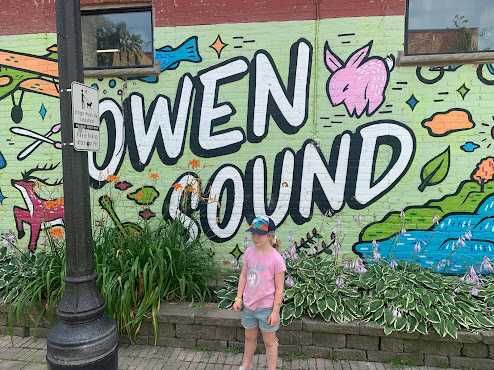 So much Owen Sound! Did you know that painter Tom Thomson is buried here? I even saw a tree en route this way that looked completely like one of his. A lovely small church in the woods, with surrounding cemetery. The church itself long closed, but the building and space restored, which was good to see. One doesn't wish these historic sites to crumble. The children wandered the cemetery looking at names and dates, and attempting to figure out how old everything is. I think the stretch of that kind of time is a bit past them, but hard to tell.
So much Owen Sound! Did you know that painter Tom Thomson is buried here? I even saw a tree en route this way that looked completely like one of his. A lovely small church in the woods, with surrounding cemetery. The church itself long closed, but the building and space restored, which was good to see. One doesn't wish these historic sites to crumble. The children wandered the cemetery looking at names and dates, and attempting to figure out how old everything is. I think the stretch of that kind of time is a bit past them, but hard to tell. 
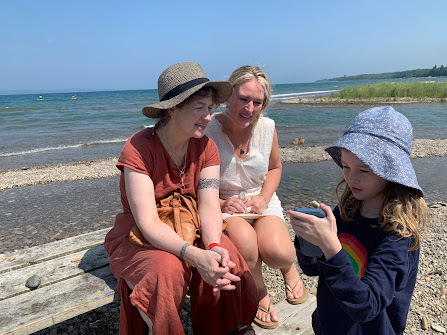 We spent time at a beach, listening to the silence of the waves. The children picked at the stones, seeking fossils. They wandered the beach. We saw a kayaker and a paddle-boarder leave from the cove. All the waves on the shore whispered shush. The children left the shore with a handful of fossils. A bag, even.
We spent time at a beach, listening to the silence of the waves. The children picked at the stones, seeking fossils. They wandered the beach. We saw a kayaker and a paddle-boarder leave from the cove. All the waves on the shore whispered shush. The children left the shore with a handful of fossils. A bag, even.
July 29, 2023
a reminder: the 'six questions' interview series,
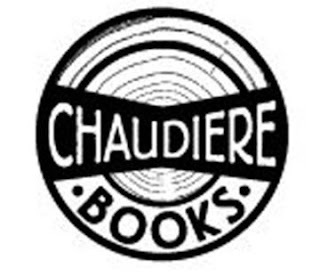 I mean, you probably already know, but in case you don't, you should check out the 'six questions' interview series I've been working weekly over at the Chaudiere Books blog (
see the latest interview here
;
see the full list with links of interviewed here
). The series interviews writers either currently or formerly Ottawa-ish, and posts a new one every Sunday! Can you believe I'm coming up to two hundred posted interviews? Gadzooks.
I mean, you probably already know, but in case you don't, you should check out the 'six questions' interview series I've been working weekly over at the Chaudiere Books blog (
see the latest interview here
;
see the full list with links of interviewed here
). The series interviews writers either currently or formerly Ottawa-ish, and posts a new one every Sunday! Can you believe I'm coming up to two hundred posted interviews? Gadzooks. The full list of current/former Ottawa-based interviewed-to-date writers include: Manahil Bandukwala : Conyer Clayton : Mark Frutkin : Dessa Bayrock : Anita Dolman : Laurie Koensgen : Sandra Nicholls : Chris Johnson : Ronnie R. Brown : Rob Thomas : Amanda Earl : Claudia Coutu Radmore : Blaine Marchand : nina jane drystek : Anita Lahey : D.S. Stymeist : John Barton : Ellen Chang-Richardson : K.I. Press : Jason Christie : Christian McPherson : Ian Roy : Gabriella Goliger : Kate Heartfield : Susan J. Atkinson : Ron Seatter : Frances Boyle : Mer Brebner : Matthew Firth : Elizabeth Hay : Sarah Kabamba : Abby Paige : Colin Morton : Mary Lee Bragg : Nadine McInnis : Namitha Rathinappillai : Helen Robertson : Maha Zimmo : Laura Farina : Rusty Priske : IAN MARTIN : Chris Jennings : Pearl Pirie : Terry Ann Carter : Nicola Vulpe : Jennifer Baker : Tim Mook Sang : David Groulx : Jean Van Loon : Warren Dean Fulton : Cameron Anstee : Joseph A. Dandurand : Missy Marston : Sean Johnston : Jennifer Faulkner : Deborah-Anne Tunney : Monty Reid : Rachel Small : Colin Browne : Wanda Praamsma : Andrea Thompson : A.M. Kozak : Julian Day : Christopher Levenson : Adele Graf : Michael Lithgow : Nicholas Power : Charlene Kwiatkowski : Jay Heins : Laura McGavin : Rob Winger : Kim Fahner : Aisling Murphy : Peter Richardson : Susan McMaster : Vera Hadzic : Christina Shah : Cindy Arlette Orellana : Cyril Dabydeen : Carla Hartsfield : Ranylt Richildis : Sarah Priscus : Armand Garnet Ruffo : Adam Meisner : Brandon Crilly : Justin Million : Debra Martens : Robert Hogg : Alison Gresik : Cara Waterfall : Adrienne Stevenson : Natalie Morrill : Grant Wilkins : Marnie Pomeroy : Simon Turner : Sonia Tilson : Pamela Mosher : Lana Crossman : Kathleen Klassen : rob mclennan : Michael F. Stewart : Nathan Hauch : Suzanne Alyssa Andrew : Richard-Yves Sitoski : Jérôme Melançon : Allana Stuart : Sonia Saikaley : Waubgeshig Rice : Mary F. Hawkins : Peter Darbyshire : Naomi K. Lewis : Albert Dumont : Jacqueline Bourque : Allison Armstrong : Christy Ann Conlin : Katie Welch : Wade Bell : Chantel Lavoie : Andrew Faulkner : Michael Caesar : Janna Klostermann : df parizeau : Dave Gregory : Jessie Keith Butler : : Jennifer Cox : Rob Manery : Phil Mader : Liam Burke : Michael Murray : Becky Halton : Olive Andrews : Michael Blouin : Tanya Rakh : Brenda Chapman : Kimberly Quiogue Andrews : Zoe Dickinson : Sarah Feldman : Jeremy Hanson-Finger : Myriam Legault-Beauregard : Suzanne Doerge : Gordon G. Bowman : Leah Schnurr : Charlotte Esme Frank : Anvesh Jain : Chris Lackie : Shannon Quinn : Leslie Roach : John Geddes : Katherine Lawrence : Tree Abraham : Salem Paige : Carolyne Van Der Meer : Selim Ulug : Mark Bourrie : Dean Steadman : Sharon King-Campbell : David Blaikie : Katie Nolan : Rhiannon Ng Cheng Hin : Laurie Anne Fuhr : Andrea Vasile : Lisa Alletson : allison calvern : Mary-Lou Zeitoun : Maria Saba : Heather Ferguson : James K. Moran : Cath Morris : Jamie Chai Yun Liew : Barbara Sibbald : Michael Bryson : Abigail Rabishaw : Samara Garfinkle : Sierra Duffey : Michelle Sinclair : Nathan Erb : Alix Laimite : Trevor Mahon : Kyle Vingoe-Cram : Gerald Lynch : John Moss : Murray Citron : Frances Peck : Amelinda Bérubé : Stephanie Bolster : Fabienne Shepherd Stone :
July 28, 2023
12 or 20 (second series) questions with Caleb Curtiss
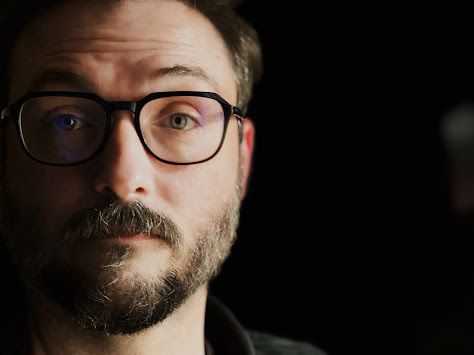 Caleb Curtiss
is the author of
Age of Forgiveness
, forthcoming from Sundress in September. His poems appear in Gettysburg Review, Witch Craft Magazine, Image, New England Review, and TriQuarterly.
Caleb Curtiss
is the author of
Age of Forgiveness
, forthcoming from Sundress in September. His poems appear in Gettysburg Review, Witch Craft Magazine, Image, New England Review, and TriQuarterly.1 - How did your first book or chapbook change your life? How does your most recent work compare to your previous? How does it feel different?
I published a chapbook before Age of Forgiveness that probably changed my life, though it’s hard for me to say exactly how. I’m probably more anxious now.
2 - How did you come to poetry first, as opposed to, say, fiction or non-fiction?
Growing up, I had a little bit of contempt for poetry. Protesting too much. Eventually, in my late twenties, I took a poetry class at my community college and was, for the first time, able to imagine why someone might choose to read, write, and think about poems. The syllabus was more or less Dickinson to Whitman to Frost to Stevens to Frost to Brooks to Frost to Sharon Olds. Ended the semester with some “two roads diverged in a yellow wood.”
3 - How long does it take to start any particular writing project? Does your writing initially come quickly, or is it a slow process? Do first drafts appear looking close to their final shape, or does your work come out of copious notes?
I’m kind of a slow learner and my process tends to reflect that. It feels like I’ve been working on Age of Forgiveness for the last ten years or so. Probably I have been, in some ways. A few of the poems in the book are from early on in my writing life, but I didn’t start working on it as a book until 2019, and it won’t become one until September 2023.
So, between 4 and ten years.
4 - Where does a poem usually begin for you? Are you an author of short pieces that end up combining into a larger project, or are you working on a "book" from the very beginning?
Oh, I’m definitely a combiner of shorter pieces. Notes or ideas I’ve been rolling with with start to take shape, etc. Eventually, those shapes start to fit together…or they don’t and they end up buried on a hard drive somewhere.
5 - Are public readings part of or counter to your creative process? Are you the sort of writer who enjoys doing readings?
There’s plenty to like and dislike. I look at readings as an opportunity to tune my audience’s ears to the frequency my work is on. As a teacher I feel pretty comfortable in front of a crowd, and I put a good amount of thought into what I read and how I read it. Can it be stressful, to stand in front of strangers and share your precious art? It can be, but it doesn’t have to be.
6 - Do you have any theoretical concerns behind your writing? What kinds of questions are you trying to answer with your work? What do you even think the current questions are?
Probably not? I think I’m mostly interested in all the first-year-poetry-student stuff still. I think a lot about form and voice, repetition, order, metaphor. Other stuff, too, but those are the main ones. My main question always seems to be, how am I supposed to write this poem that my brain is trying to make me write?
7 – What do you see the current role of the writer being in larger culture? Do they even have one? What do you think the role of the writer should be?
Writers think and create artifacts of their thoughts. There’s plenty of evidence that the current role of writers in our larger culture is to create marketable artifacts. I’m sure there’s more to it than that, but maybe there isn’t. I don’t know what a writer ought to be in our larger culture, and that’s the truth. I just know writers should definitely be in the larger culture.
8 - Do you find the process of working with an outside editor difficult or essential (or both)?
I think it’s essential. It can be difficult, but it doesn’t have to be. I was lucky to work with Tennison Black at Sundress who was a constant source of creative energy for this project. Kit Frick edited my chapbook at Black Lawrence, and that experience was equally generative for me as a poet. Caitlin Rae Taylor helped me solve a really formally and emotionally difficult problem in a poem she published at Southern Humanities Review. I’m forever grateful to these editors and all the others out there like them.
Of course, I’ve also had ~not great editorial experiences~, but this isn’t a Taco Bell, so I take what I get and do what I can to learn from it.
9 - What is the best piece of advice you've heard (not necessarily given to you directly)?
I’m paraphrasing an old friend here who advised me to not die and to keep writing at whatever pace I could: “eventually enough people will start to like your work.”
10 - What kind of writing routine do you tend to keep, or do you even have one? How does a typical day (for you) begin?
I parent and adjunct, so my writing routine works best in summertime when the children are at camp. I’ll drop them off and go to the gym where I write for about an hour, play basketball, stretch, and then return to what I’ve written until it’s time for pickup. The day is always short, the writing often sparse.
11 - When your writing gets stalled, where do you turn or return for (for lack of a better word) inspiration?
I play pickup basketball and then stretch for six hours afterwards. That usually gets me to where I need to be. Sometimes pickle ball helps.
12 - What fragrance reminds you of home?
School library.
13 - David W. McFadden once said that books come from books, but are there any other forms that influence your work, whether nature, music, science or visual art?
I’m inspired by visual art. I seek it out, hang it on my walls, think about it, and write about it, too. A few years back I became a little bit obsessed with this visual essay called First Adventures in Beauty by Lia Purpura. Technically a book, I guess. Books that are art interest me a lot. I’m thinking of Book of No Ledge by Nance Van Winckel, Mary Reufle’s erasure books, both of Karen Green’s books and a handful of other Siglio titles.
14 - What other writers or writings are important for your work, or simply your life outside of your work?
Nance Van Winckel’s oeuvre inspired a lot of what you’ll see in Age of Forgiveness.
15 - What would you like to do that you haven't yet done?
I’d really like to visit Mérida.
16 - If you could pick any other occupation to attempt, what would it be? Or, alternately, what do you think you would have ended up doing had you not been a writer?
I don’t really see myself primarily as a writer. I’m a parent, a teacher, a family member, a displaced midwesterner, etc. I’m a writer, too, though. Sometimes I’m more of one, other times I’m less of one.
17 - What made you write, as opposed to doing something else?
Writing has always felt special to me. I have great memories of learning how to do it.
18 - What was the last great book you read? What was the last great film?
Heat 2 by Michael Mann & Meg Gardiner and Heat (1995).
19 - What are you currently working on?
Right now I’m preparing for the Lewes Creative Writers’ Conference where I get to present next month. I’m also starting to think about the coming semester and all the changes I’ll make to my syllabus. Promoting the book, of course. Some writing is making its way in, too, but I wouldn’t want to overstate that at all.
12 or 20 (second series) questions;
July 27, 2023
Ana Božiĉević, NEW LIFE
5 THINGS AT 40
You are not crazy, it’sthe patriarchy
You’re not a loser, it’sthe capitalism
You are not old, time’snot really a thing
You’re not alone, I’mhere
You’re made of stars,that’s fucking cool
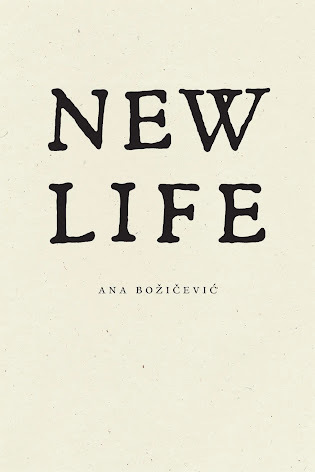 Thelatest from New York-based “poet, translator, teacher, and occasional singer” Ana Božiĉević,
NEW LIFE
(Wave Books, 2023), a curious assemblage of lyric first-personstudies. Božiĉević’s poems appear as sketches of accumulated phrases thatcluster together to form thoughts, narrative and sentences; poems that writethe heart from the floor’s foundation, providing narrative substance beforeslipping into a kind of abstract. “If wishes were horses I would have no horse.”she writes, to open the poem “PSYCHOMAGIC,” “I opened my pussy and a crow flewin. / My heart is a dog sleeping / On our love’s grave. / Yeah I’ve beenkeeping my / Heart open for you like an elevator / With my bare hands, and now/ It’s closing as fast as / The escape hatch / In the sci-fi movie. At thespeed / Of a casket lid.” With precise language, she writes a clarity fromwithin and around her particular temporal and cultural moment, offering songsof experience and passionate resolve that hold firm in both their thinking, aswell as a curiosity. These are smart and articulate poems. As the poem “LONGLINES” opens: “Looked around your life & / Found no place to sit / So I’vejust been standing / This whole time / And every time I look in / Like that I see/ A different color room / Full of beautiful strangers [.]”
Thelatest from New York-based “poet, translator, teacher, and occasional singer” Ana Božiĉević,
NEW LIFE
(Wave Books, 2023), a curious assemblage of lyric first-personstudies. Božiĉević’s poems appear as sketches of accumulated phrases thatcluster together to form thoughts, narrative and sentences; poems that writethe heart from the floor’s foundation, providing narrative substance beforeslipping into a kind of abstract. “If wishes were horses I would have no horse.”she writes, to open the poem “PSYCHOMAGIC,” “I opened my pussy and a crow flewin. / My heart is a dog sleeping / On our love’s grave. / Yeah I’ve beenkeeping my / Heart open for you like an elevator / With my bare hands, and now/ It’s closing as fast as / The escape hatch / In the sci-fi movie. At thespeed / Of a casket lid.” With precise language, she writes a clarity fromwithin and around her particular temporal and cultural moment, offering songsof experience and passionate resolve that hold firm in both their thinking, aswell as a curiosity. These are smart and articulate poems. As the poem “LONGLINES” opens: “Looked around your life & / Found no place to sit / So I’vejust been standing / This whole time / And every time I look in / Like that I see/ A different color room / Full of beautiful strangers [.]”
July 26, 2023
Once upon a time in the West (of Ottawa, but still in Ontario, (part one,
Okay,so it feels like forever since we’ve been anywhere [Vancouver in February 2020;the UK in 2018], especially the whole group of us, beyond heading tofather-in-law’s in Picton, or mother-in-law’s cottage in Sainte-Adèle. We didbig ridiculous car trips at the end of each of Christine’s maternity leaves[see our trip with wee Rose here; our trip with wee Aoife and toddler Rose here,none of which our young ladies would recall], so here we are on a years-long-awaitedweek-plus drive west to Burlington, Oakville, Woodstock etcetera, all centredaround a conference that Christine is presenting at in London, Ontario. Might weeven survive the journey?
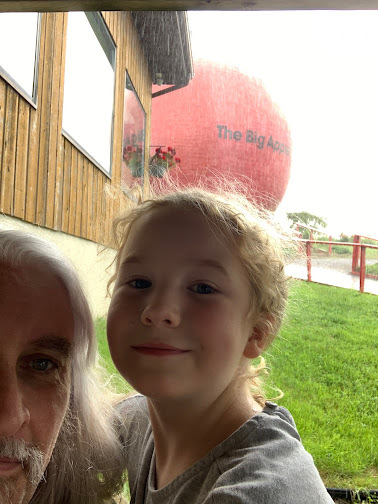 Saturday, July 22, 2023: On Saturday, we wokeearly(ish) and headed west for two nights of a hotel in Oakville, thinking thata good half-way point would be to stop at the Big Apple along the 401, just byColborne, to lunch and let the kids run around. A petting zoo! A wee train! Mini-puttgolf! I mean, if that doesn’t scream “vacation,” then what does? And given thelength of our drive, we presumed it far more interesting for the young ladiesthan simply grabbing a quick bite and one of the EnRoute locations (which arefine, but the children required a bit more).
Saturday, July 22, 2023: On Saturday, we wokeearly(ish) and headed west for two nights of a hotel in Oakville, thinking thata good half-way point would be to stop at the Big Apple along the 401, just byColborne, to lunch and let the kids run around. A petting zoo! A wee train! Mini-puttgolf! I mean, if that doesn’t scream “vacation,” then what does? And given thelength of our drive, we presumed it far more interesting for the young ladiesthan simply grabbing a quick bite and one of the EnRoute locations (which arefine, but the children required a bit more).Welanded at the Big Apple, which has become a carnival in comparison to what itwas when I first landed there back in 1993 with parents and toddler Kate. Apparentlythere’s been a new owner a decade or back ago, which really ramped up everything,from their winemaking to beermaking to rooms upon rooms of gift shop. There’sstill the mini-putt golf and the petting zoo (moved to accommodate an extendedparking lot, now twice the size) and the train for the kids, which is entertainingenough, but the whole thing of it seems to be a massive gift shop withentertainments to draw you in. Either way, I’m still in. A three-storey randomapple-shaped building on the side of the highway that pulls in busloads oftourists? Genius.

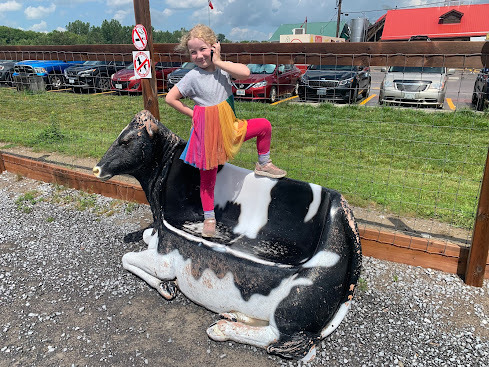 Aoifeand I did wander towards the apple itself (when Rose and Christine still in thegift shop), but we were caught in a downpour, which prompted us underneath thepatio deck with twenty other people for cover. It rained very hard! But she andI crouched down and still managed a selfie with the apple behind us. And thenwe found a quarter!
Aoifeand I did wander towards the apple itself (when Rose and Christine still in thegift shop), but we were caught in a downpour, which prompted us underneath thepatio deck with twenty other people for cover. It rained very hard! But she andI crouched down and still managed a selfie with the apple behind us. And thenwe found a quarter!Oncewe left the apple, we drove around Toronto and into Burlington, where wevisited with Christine’s cousin Kim (technically her mother’s cousin) for a weebit. The children were handed many treats and colouring equipments, which theythoroughly enjoyed. And driving through Streetsville en route to our hotel inOakville (where I said hello in my head to Anne Stone’s parents—Anne and I stayedwith them briefly in spring 1999 during a two-day break in our nearly twomonths of touring our books together) Christine drove us by the two houses shelived in while wee—the house she was brought home from the hospital to as ababy (which she didn’t recall) and the house she grew up in, and lived in untilshe left home for university (the young ladies were sort of interested and thencompletely not interested).
 Andthen to the hotel, where we dinnered and crashed for a bit. I met Andy Weaverfor a drink in the box-store monstrosity across the street. Apparently thestaff were baffled when I asked if I could walk there (due to the creek/forestbetween hotel and the mall). A ten minute walk, but apparently no one walksaround here? Cars were even slowing down to look at me strangely, walking onthese otherwise empty sidewalks. And I’m certain that there have been murdersinside those bushes. I suspect there are people probably living in there aswell.
Andthen to the hotel, where we dinnered and crashed for a bit. I met Andy Weaverfor a drink in the box-store monstrosity across the street. Apparently thestaff were baffled when I asked if I could walk there (due to the creek/forestbetween hotel and the mall). A ten minute walk, but apparently no one walksaround here? Cars were even slowing down to look at me strangely, walking onthese otherwise empty sidewalks. And I’m certain that there have been murdersinside those bushes. I suspect there are people probably living in there aswell.

We also drove twice (while looking at Christine houses) by a building inMississauga that was the colour of the sky. I posted it in socials as “THERE ISA BUILDING IN MISSISSSAUGA THE SAME COLOUR AS THE SKY,” and enough peoplecommented on how that should either be a title or opening line that I made somequick notes while awaiting Andy at the ridiculous chain-restaurant patio. Maybe? [Watch my substack over the next few weeks]

 Sunday, July 23, 2023: Morning plans shifted abit, so we decided to make our way to Canada’s Wonderland, deliberately nottelling the young ladies where we were going until we could see the park fromthe highway, which prompted them both to start screaming. Happily, of course. GivenChristine grew up local to here, she went here lots as a kid with her family,and even more as a teen with her friends, but I’d only been once around sixteenor seventeen years of age along with my scout troupe. Our day the was one ofheavy rain, and watching the water flow like rivers through the cobblestonestreets, it having nowhere else to go. We went on the roller coaster repeatedlyin an empty park (when they’d open it again, due to rain). I think my pal RalphWilliamson and others went on the white water rafting. I mean, we were already soaked,so why not?
Sunday, July 23, 2023: Morning plans shifted abit, so we decided to make our way to Canada’s Wonderland, deliberately nottelling the young ladies where we were going until we could see the park fromthe highway, which prompted them both to start screaming. Happily, of course. GivenChristine grew up local to here, she went here lots as a kid with her family,and even more as a teen with her friends, but I’d only been once around sixteenor seventeen years of age along with my scout troupe. Our day the was one ofheavy rain, and watching the water flow like rivers through the cobblestonestreets, it having nowhere else to go. We went on the roller coaster repeatedlyin an empty park (when they’d open it again, due to rain). I think my pal RalphWilliamson and others went on the white water rafting. I mean, we were already soaked,so why not?Therewas much running around. Each child had big emotions at either end of our visitfor their insistence upon attempting to win something banging up against theirinability to actually win anything. why do they insist on these things? And whydo they get so upset at an outcome that is entirely built in? One child at thebeginning, and the other at the end. There was much sobbing. But still, therewas much excitement and hot hot hot hot but at least a bit of a breeze for thebulk of our visit. We did about five hours, as the kids ran around on rides(some repeatedly), begged us to buy them things, we spent much of their college/universitymoney on food and even picked up some t-shirts (although in hindsight, I regretnot attempting postcards, but we were just too overwhelmed). It was curiousbeing aware that this was such a familiar space to Christine: as I grew up onthe farm, this isn’t anything I had any experience with. We did farm things. Westayed home. And when we did travel (mainly in the 1970s, before my mother’sillness took over), it was more driving trips to historic sites and towns andsuch. I recall the covered bridge in the east coast, and that creepy wax museum on Prince Edward Island, for example, when I might have been seven. I doubt myfather would have had the patience for a big park like this when I was young.
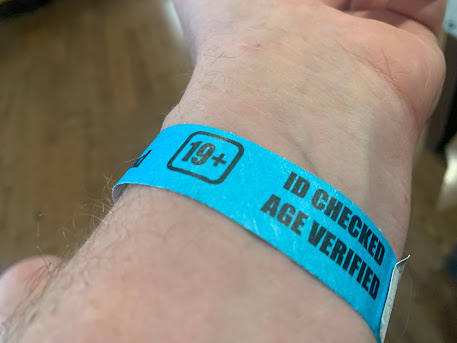 Andthen the last hour of our time there completely rained out. They’d closed oneof the kid roller coasters for thunder, re-opened and Christine and Rose got on(while Aoife and I had lunch), but by the time we’d switched, it was closedagain. Aoife and I waited twenty minutes at the gate (at least we were undercover, unlike the other two), but it was a no-go. We got completely soaked attemptingthe way out, although I found a beer hutch, which was useful. When I purchased mySEVENTEEN DOLLAR BEER, I was told I had to wear this wrist-band that proved toany staff or security that I was of legal drinking age, and therefore had theability to wander the park with a drink. Um, what? ARE YOU SAYING THAT WITHOUTTHIS WRIST-BAND YOUR STAFF WOULD OTHERWISE THINK ME UNDERAGE?
Andthen the last hour of our time there completely rained out. They’d closed oneof the kid roller coasters for thunder, re-opened and Christine and Rose got on(while Aoife and I had lunch), but by the time we’d switched, it was closedagain. Aoife and I waited twenty minutes at the gate (at least we were undercover, unlike the other two), but it was a no-go. We got completely soaked attemptingthe way out, although I found a beer hutch, which was useful. When I purchased mySEVENTEEN DOLLAR BEER, I was told I had to wear this wrist-band that proved toany staff or security that I was of legal drinking age, and therefore had theability to wander the park with a drink. Um, what? ARE YOU SAYING THAT WITHOUTTHIS WRIST-BAND YOUR STAFF WOULD OTHERWISE THINK ME UNDERAGE?Excuse me, sir, but I am only fifteen.
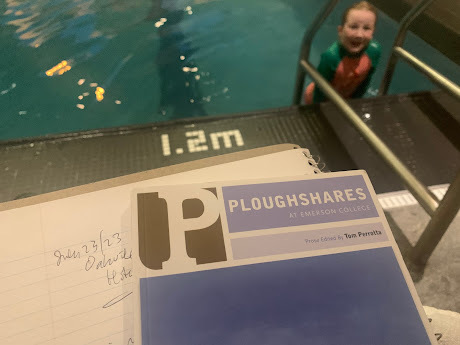 Wedid manage to get through and out of the park in the ongoing downpour, andthere was that second bout of crying, but we were mostly fine. We even foundthe car again pretty quickly, but had to rush back to the hotel to completelychange, which made us about an hour late to visiting Christine’s childhoodfriend Kim (a different Kim than yesterday), but that was fine. Kim’s daughterrecently became a teen, so the young ladies were offered mounds of her daughter’sleavings, from stuffed animals to ridiculous toys to comforters to books. They couldn’timagine their incredible luck! And when I say “they,” I mean the children(getting toys etc) and Kim (who got to clear out a bunch of her house). We hadto get bags from the car. God sakes.
Wedid manage to get through and out of the park in the ongoing downpour, andthere was that second bout of crying, but we were mostly fine. We even foundthe car again pretty quickly, but had to rush back to the hotel to completelychange, which made us about an hour late to visiting Christine’s childhoodfriend Kim (a different Kim than yesterday), but that was fine. Kim’s daughterrecently became a teen, so the young ladies were offered mounds of her daughter’sleavings, from stuffed animals to ridiculous toys to comforters to books. They couldn’timagine their incredible luck! And when I say “they,” I mean the children(getting toys etc) and Kim (who got to clear out a bunch of her house). We hadto get bags from the car. God sakes.Ikept the wrist-band on to show it to Kim, also. I only took it off once we wereback at the hotel, as Aoife had a final pre-bedtime dip in the hotel pool. Andyhad given me a copy of the most recent issue of Ploughshares, which I triedto flip through, but wasn’t completely able to, yet.
"name this band"
Monday, July 24, 2023: Woke, eventually. Left Oakville(an hour late, naturally) for the wilds of Thorold, to visit Christine’s greatuncle Charlie and great aunt Brenda (Charlie is mother-in-law’s uncle, although they’reroughly the same age). In the hotel parking lot, a full coffee behind someone’scar, meaning there was someone else miles away from the parking lot realizing theyhadn’t brought it along.



Wehadn’t seen Charlie and Brenda in some time, and not since Charlie’s stroke, soit was good to spend some time with them and see where they’re at. It was theirdaughter’s wedding we were at back in 2019 down this way when Christine landedin hospital with meningitis, at the onset of September (she was in hospital in Niagara a week before transferred into Ottawa for a few days; I wentback to Picton to collect children and car from father-in-law so Rose couldbegin grade one that following morning). Charlie ended up moving into differentdirections from his youthful adventurings, but he was once one of the original artists (along with John Moffat, Dennis Tourbin and John Boyle) of the Niagara Artists Centre in St. Catharines, and was involved with all of that activity inthe late 60s and into the 70s, which is pretty cool to realize. A few yearsback he even sent me a bunch of photos he took of Tourbin during a particulartour around Ontario. I spent a great deal of time with Tourbin and Moffat inthe 1990s (and John Boyle, when he came through town to visit Tourbin), sointeresting to realize that connection.
Fromthere we landed with Brenda at her late mother’s house right byNiagara-on-the-Lake, to see if anything we might have wished from the house,which they’ve yet to empty and sell. A large house on a lovely lot, a formerfruit farm, right by a winery. Oh my.
 Andthen from there we drove to Great Wolf Lodge, a site I wasn’t aware of until welanded. This place is ridiculous. With its log-building structure, massivenessand expense, this is clearly Montebello-for-kids. I fear what may happen next.
Andthen from there we drove to Great Wolf Lodge, a site I wasn’t aware of until welanded. This place is ridiculous. With its log-building structure, massivenessand expense, this is clearly Montebello-for-kids. I fear what may happen next.
July 25, 2023
THE ABOVE/GROUND PRESS 30TH ANNIVERSARY READING/LAUNCH/PARTY!
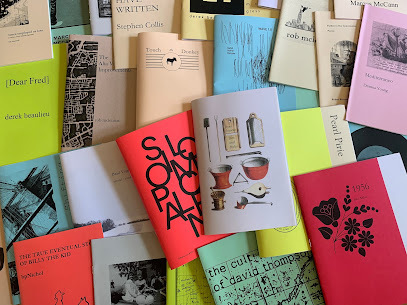 celebrating THIRTY YEARS of continuous activity (andnearly thirteen hundred publications), Ottawa publisher above/ground presspresents:
celebrating THIRTY YEARS of continuous activity (andnearly thirteen hundred publications), Ottawa publisher above/ground presspresents:readings and chapbook launches by:
Jennifer Baker (Ottawa ON)
nina jane drystek (Ottawa ON)
Amanda Earl (Ottawa ON)
Adrienne Ho Rose (Iowa City IA)
Sophia Magliocca (Montreal QC)
Karen Massey (Ottawa ON)
Jérôme Melançon (Regina SK)
Monty Reid (Ottawa ON)
+
Grant Wilkins (Ottawa ON)
lovingly hosted by above/ground press editor/publisherrob mclennan
SATURDAY, AUGUST 12, 2023
downstairs at the Clocktower Brew Pub, Glebe
575 Bank St, Ottawa
https://www.clocktower.ca/locations/glebe-brew-house/
7pm door/7:30pm reading
$10 at the door (cash only! although e-transfer possible,I suppose); includes copies of two recent above/ground press titles
author/performer biographies:
Jennifer Baker is a poet and AdjunctProfessor of English Literature living and working in Ottawa. She is the authorof three chapbooks: Abject Lessons (above/ground press, 2014), MementoMishka (with David Currie, Apt.9 Press, 2023) and Groundling(Trainwreck Press, 2021). Her poetry, reviews, and articles can be found in ottawater,Dusie, Canthius, The Bull Calf, Canadian Literature,The Journal of Canadian Poetry, and Robert Kroetsch: Essayist,Novelist, Poet (University of Ottawa Press, 2020), among others, and she isthe 2022 honourable mention recipient of Arc Poetry Magazine’s DianaBrebner Prize.
She will be launching an above/ground press reissue ofher Trainwreck Press chapbook, Groundling: On Apology, her secondtitle with above/ground press, following Abject Lessons (2014).
nina jane drystek is a poet, writerand performer based in Ottawa, unceded Algonquin Anishinaabe territory. she isauthor of a:of:in (Gap Riot Press, 2021) and knewro suite(Simulacrum Press, 2019), and her poems have appeared in online and printpublications, as well as in self-published chapbooks and broadsides. heroriginal sound poem scores can be heard on bandcamp. she is one of the co-foundersof Riverbed Reading Series, was shortlisted for the 2020 Bronwen Wallace Awardfor Poetry, writes collaborative poetry with VII – authors of holy disorderof being (Gap Riot, 2022) and Towers (Collusion Books, 2021) – andperforms sound poetry with the rotating group of collaborators. if you haveever lived in the same city as her you have likely seen her riding a red orblue bicycle. you can find her @textcurious or contact her via electronic mail.
She will be launching the chapbook missingmatrilineal, her first with above/ground.
Amanda Earl (she/her) is apolyamorous, pansexual intersectional feminist living on Algonquin Anishinaabegunceded territory. Her works with spines are Trouble (Hem Press, 2022), Genesis(Timglaset Editions, 2022), Coming Together Presents Amanda Earl(Coming Together, 2014) and Kiki (Chaudiere Books/now with InvisiblePublishing, 2014). She self-publishedher e-novella, A World of Yes in 2015 and will self-publish her poetrybook, Beast Body Epic in autumn 2023, after turning 60. She is theauthor of over 30 chapbooks, including 14 visual poetry chapbooks. More info isavailable at AmandaEarl.com. Connect with Earl on Twitter @KikiFolle
She will be launching Touch the Donkey [a smallpoetry journal] #38, which includes an excerpt of a longer work-in-progress.She is also the author of ten chapbooks with above/ground press, including Eleanor(2007), The Sad Phoenician’s Other Woman (2008), Sex First & ThenA Sandwich (2012), A Book of Saints (2015), Lady Lazarus Redux(2017), The Book of Mark (2018), Aftermath or Scenes of a WomanConvalescing (2019), Sessions from the DreamHouse Aria (2020), afield guide to fanciful bugs (2021) and THE BEFORE, an excerpt fromWelcome to Upper Zygonia (2022). above/ground press also produced a festschriftcelebrating Earl’s work, Report from the Earl Society, Vol. 1 No. 1(2022).
Adrienne Ho Rose was born inToronto, grew up in Ottawa, and has been living in the US heartland since 2004.Her poems and translations have been published in Canadian and US journals,including Arc Poetry Magazine and Bywords and most recently ottawater.She directs the undergraduate translation program at the University of Iowa.
She will be launching her chapbook debut, which is as-yet-untitled.
Sophia Magliocca is a Master’sstudent in English Literature at Concordia University (Tiohtià:ke/ Montreal) whereshe researches the effects of (mis)interpreting how women’s legacies aredocumented across literary history. Sophia is a known lover of travel, pastaand orange cats. Most recently she has published poetry in Canadian literaryjournals such as Yolk, Montreal Writes and periodicities: ajournal of poetry and poetics. Find her on Instagram @sophmagli
She will be launching her chapbook debut, Girlgives long-fingered self-portrait.
Karen Massey (she/her) lives inOttawa, Canada, on unceded Algonquin Anishinabe territory. Her poems &found poems have been published online, in 2 chapboooks, over 2 dozen printanthologies, & in literary journals including TNQ, Aesthetica,Mslexia, subTerrain & Arc Poetry Magazine, where shereceived the 2020 Diana Brebner Award.
She will be launching SONGS FROM THE DEMENTIA SUITCASE,her third above/ground press title after Bullet (1999) and StrangeFits of Beauty & Light (2014).
Jérôme Melançon lives in oskanakâ-asastêki / Regina, Saskatchewan. His most recent poetry collection is End’sous d’la langue (Prise de parole, 2021). He has also published two booksof poetry with Éditions des Plaines, De perdre tes pas (2011) and Quelquespas quelque part (2016), as well as one book of philosophy, La politiquedans l’adversité (Metispresses, 2018). He regularly publishes poetry criticism,notably in the online journal periodicities: a journal of poetry and poetics,and his essay on above/ground press’ thirty years of activity can be read in ArcPoetry Magazine #101. He has edited books and journal issues, mostly inpolitical philosophy, and keeps publishing academic articles that marginallyrelate to these poems. He can be found on social media with the handle@lethejerome.
He will be launching the chapbook Bridges underthe Water, his third above/ground press title following Coup (2020) and Tomorrow’s Goingto Be Bright (2022).
Monty Reid is an Ottawa poet. Heprefers short poems.
He will be launching the chapbook Where there’ssmoke, his sixth chapbook with above/ground press, after Six Songsfor the Mammoth Steppe (2000), cuba A book (2005), In the Garden(sept series) (2011), Moan Coach (2013) and seam (2018).
Grant Wilkins is an occasional poet,printer and papermaker from Ottawa who has made a practice of doing strangethings to other people’s words. He has degrees in History & ClassicalCivilization and in English, and he likes ink, metal, paper, letters, soundsand words, and combinations thereof.
He will be launching the chapbooks PoeticConstructions and The Baroness and her Ex Read Orgasmic Toast: ToWhom It May Concern, his third and fourth chapbooks with above/groundpress, after Reading The Great Classics Of Canlit through Book 5 ofbpNichol’s The Martyrology (2022) and In Which Archibald Lampman /Translates Arthur Rimbaud (2023).
see a report on the 26th anniversary event here:
the 25th anniversary event here:
the 23rd anniversary (Ottawa) event here:
the 23rd anniversary (Toronto) event here:
the 20th anniversary event here:
and the 19th anniversary event here:



